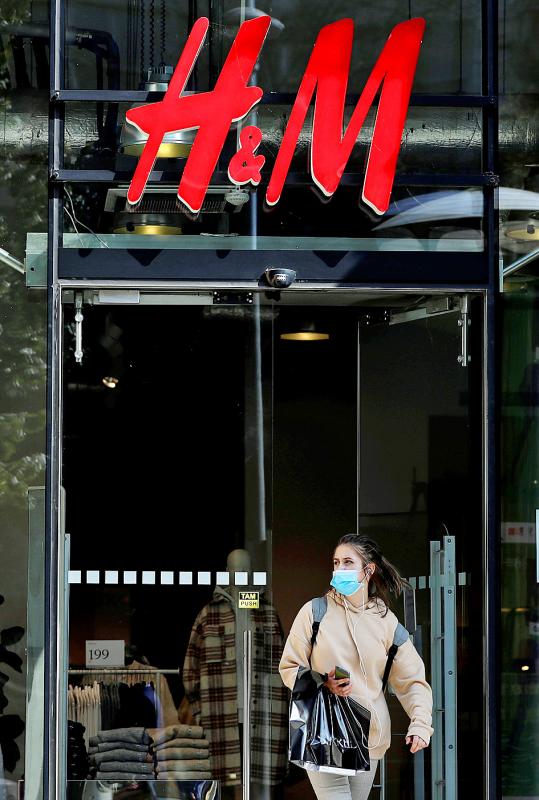Swedish clothing giant Hennes & Mauritz AB (H&M) on Tuesday said that it was ending its relationship with a Chinese yarn producer over accusations of “forced labor” involving ethnic and religious minorities from China’s Xinjiang region.
The fashion retailer specified that it did not work with any garment factories in the region and that it would no longer source cotton from Xinjiang, which is China’s largest cotton-growing area.
A report by the Australian Strategic Policy Institute think tank, published in March, pointed to H&M as one of the beneficiaries of a forced labor transfer program through their relationship with the dyed yarn producer Huafu Fashion Co’s (華孚時尚) factory in Anhui Province.

Photo: Reuters
However, H&M said in a statement that it had never had a relationship with the factory in Anhui, nor Huafu’s operations in Xinjiang.
H&M did concede that it has an “indirect business relationship with one mill” in Shangyu in Zhejiang Province, belonging to Huafu.
“While there are no indications for forced labor in the Shangyu mill, we have decided to, until we get more clarity around allegations of forced labor, phase out our indirect business relationship with Huafu Fashion Co, regardless of unit and province, within the next 12 months,” H&M said.
The company also said that it had conducted “an inquiry at all the garment manufacturing factories we work with in China aiming to ensure that they are not employing workers ... through what is reported on as labor transfer programs or employment schemes where forced labor is an increased risk.”
International pressure is building on the Chinese Communist Party over its actions in the resource-rich Xinjiang region, and the EU on Monday pressed China to let its independent observers into Xinjiang, binding human rights to future trade and investment deals with Beijing.
Rights groups say that more than 1 million Uighurs languish in political re-education camps, which Beijing describes as vocational training centers where education is given to lift the population out of poverty and to chisel away at Islamic radicalism.
China says that criticism of its handling of Xinjiang is politically motivated, and based on lies about what happens in the vast facilities it has built.
US Customs and Border Protection on Monday said it would bar a raft of Chinese products from Xinjiang over fears that they were made using forced labor.
China on Tuesday slammed the US move as “bullying” and dismissed accusations of forced labor as “a complete fabrication.”

Intel Corp chief executive officer Lip-Bu Tan (陳立武) is expected to meet with Taiwanese suppliers next month in conjunction with the opening of the Computex Taipei trade show, supply chain sources said on Monday. The visit, the first for Tan to Taiwan since assuming his new post last month, would be aimed at enhancing Intel’s ties with suppliers in Taiwan as he attempts to help turn around the struggling US chipmaker, the sources said. Tan is to hold a banquet to celebrate Intel’s 40-year presence in Taiwan before Computex opens on May 20 and invite dozens of Taiwanese suppliers to exchange views

Application-specific integrated circuit designer Faraday Technology Corp (智原) yesterday said that although revenue this quarter would decline 30 percent from last quarter, it retained its full-year forecast of revenue growth of 100 percent. The company attributed the quarterly drop to a slowdown in customers’ production of chips using Faraday’s advanced packaging technology. The company is still confident about its revenue growth this year, given its strong “design-win” — or the projects it won to help customers design their chips, Faraday president Steve Wang (王國雍) told an online earnings conference. “The design-win this year is better than we expected. We believe we will win

Chizuko Kimura has become the first female sushi chef in the world to win a Michelin star, fulfilling a promise she made to her dying husband to continue his legacy. The 54-year-old Japanese chef regained the Michelin star her late husband, Shunei Kimura, won three years ago for their Sushi Shunei restaurant in Paris. For Shunei Kimura, the star was a dream come true. However, the joy was short-lived. He died from cancer just three months later in June 2022. He was 65. The following year, the restaurant in the heart of Montmartre lost its star rating. Chizuko Kimura insisted that the new star is still down

While China’s leaders use their economic and political might to fight US President Donald Trump’s trade war “to the end,” its army of social media soldiers are embarking on a more humorous campaign online. Trump’s tariff blitz has seen Washington and Beijing impose eye-watering duties on imports from the other, fanning a standoff between the economic superpowers that has sparked global recession fears and sent markets into a tailspin. Trump says his policy is a response to years of being “ripped off” by other countries and aims to bring manufacturing to the US, forcing companies to employ US workers. However, China’s online warriors